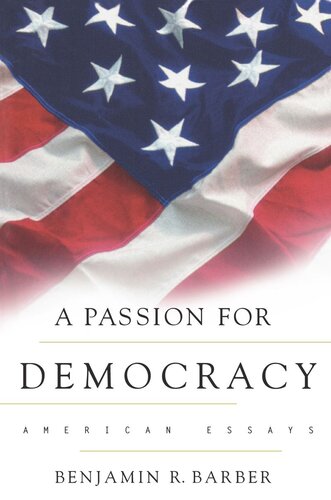

Most ebook files are in PDF format, so you can easily read them using various software such as Foxit Reader or directly on the Google Chrome browser.
Some ebook files are released by publishers in other formats such as .awz, .mobi, .epub, .fb2, etc. You may need to install specific software to read these formats on mobile/PC, such as Calibre.
Please read the tutorial at this link: https://ebookbell.com/faq
We offer FREE conversion to the popular formats you request; however, this may take some time. Therefore, right after payment, please email us, and we will try to provide the service as quickly as possible.
For some exceptional file formats or broken links (if any), please refrain from opening any disputes. Instead, email us first, and we will try to assist within a maximum of 6 hours.
EbookBell Team

4.4
102 reviewsBenjamin Barber is one of America's preeminent political theorists. He has been a significant voice in the continuing debate about the nature and role of democracy in the contemporary world. A Passion for Democracy collects twenty of his most important writings on American democracy. Together they refine his distinctive position in democratic theory. Barber's conception of "strong democracy" contrasts with traditional concepts of "liberal democracy," especially in its emphasis on citizen participation in central issues of public debate. These essays critique the "thin representation" of liberal democracy and buttress the arguments presented in Barber's twelve books, most recently in his well-received Jihad vs. McWorld: How Globalism and Tribalism Are Re-shaping the World. In these pieces, Barber argues for participatory democracy without dependence on abstract metaphysical foundations, and he stresses the relationship among democracy and civil society, civic education, and culture.
A Passion for Democracy is divided into four sections. In the first, "American Theory: Democracy, Liberalism, and Rights," Barber addresses issues of ongoing relevance to today's debates about the roots of participatory democracy, including individualism vs. community, the importance of consent, and the irrelevance of Marxism. Essays in the second section, "American Practice: Leadership, Citizenship, and Censorship" provide a "strong democracy" critique of American democratic practice. "Education for Democracy: Civic Education, Service, and Citizenship" applies Barber's theories to three related topics and includes his much-discussed essay "America Skips School." The final section, "Democracy and Technology: Endless Frontier or End of Democracy?" provides glimpses into a future that technology alone cannot secure for democracy.
In his preface, Barber writes: "In these essays ... I have been hard on my country. Like most ardent democrats, I want more for it than it has achieved, despite the fact that it has achieved more than most people have dared to want." This wide-ranging collection displays not only his passion for democracy, but also his unique perspective on issues of abiding importance for the democratic process.